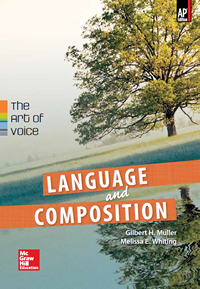
Language and Composition: The Art of Voice (Muller and Whiting)Chapter 1: Active Reading and Response to TextsChapter OverviewWelcome to Advanced Placement* English Language and Composition! Much of what you will learn here mirrors the readings and activities in a first-year college composition course. This textbook will help you read and write effectively, not only in academic settings, but in settings encompassing the workplace and beyond. Many reading and writing skills—such as the ability to analyze, critique, and synthesize information—are seemingly timeless. To gain a voice in the 21st-century Information Age, however, you also must know how to read and write several different kinds of texts both in print and electronic formats, develop technological skills, and learn how to apply these skills in new and developing contexts. Changes in technology and society itself are transforming the way we read and respond to texts. You write in numerous print and digital environments. In all likelihood, you are texting, tweeting, and blogging (or at least reading others’ blogs); maintaining Web sites of your own; creating and uploading podcasts; sharing video clips on YouTube or audio files through peer-to-peer programs; and interacting in multiple formats on social networking sites. And you probably are making electronic presentations in the classroom while still using pen and paper to take notes or to create journal entries. In brief, your literacy environment is far more complex than in previous generations. According to the National Council of Teachers of English, a literate person in the 21st century must be able to
As a 21st-century student, you will be swimming in an ocean of information sources; and you will need to approach texts with both focus and skills that go beyond casual reading, or the type you may do for leisure or escapism. Even in courses in which most work involves learning new knowledge and technologies—computer science, mathematics, or biochemistry, for example—you are sure to find a healthy amount of reading that supplements the other classroom or laboratory activities. And increasingly, the read-write universe that awaits you will require an interactive approach. The reading and writing skills you develop this year will help you in your future profession (or professions). Consider, for example,
All of these activities require the ability to think, read, and write about complex material. You should learn to read actively to see the difference between established facts, informed ideas, and pure speculation; rational arguments versus emotional ones; and organized essays versus structurally deficient ones. Reading and writing are still the main ways that thoughtful people work out controversial issues involving the family, society, politics, and work. You will encounter complex and varied texts and visuals throughout life that require you to extract maximum meaning, to compare your views with those of the writers, and to respond in an informed and coherent manner. The reading selections in this textbook have been chosen specifically to assist you in developing and sharpening such skills. As you tackle these pieces, you will realize that sound and engaged reading habits permit you to understand the fine points of logic, reasoning, analysis, argumentation, and evaluation. * Advanced Placement Program and AP are registered trademarks of the College Board, which was not involved in the production of, and does not endorse, this product. |  |















